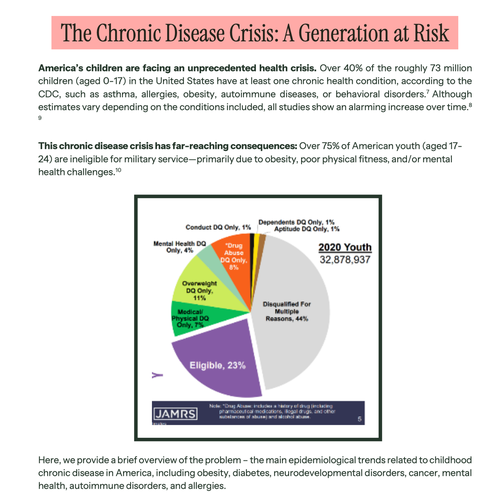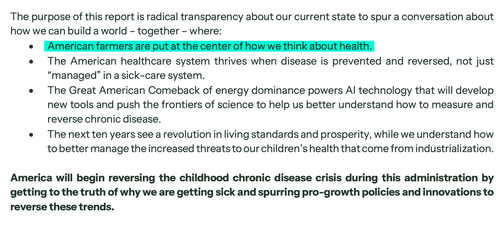Delivering on President Trump's Executive Order 14212, the "Make America Great Again" (MAHA) Commission released a 72-page report titled "The MAHA Report: Make Our Children Healthy Again," outlining America's childhood chronic disease crisis and its potential contributing causes.
However, before listing the host of potential contributing causes of chronic illnesses, the report first addresses "Corporate Capture and the Revolving Door." Starting on page eighteen, the incestuous relationship between big government and bigger monopolies begins to paint a picture of how we've ended up here in the first place—a complete lack of surprise for anyone familiar with "regulatory" agencies.
Beginning under President Franklin D. Roosevelt—a fan of Benito Mussolini and Giovanni Gentile's fascist economic framework—the Executive branch began creating agencies to "administrate" the various social programs created by the New Deal. Sometimes referred to as "the swamp," or as Mussolini called it, "the state within the state," Americans have come to know these agencies of unelected bureaucrats as the "Administrative State."
"Although the U.S. health system has produced remarkable breakthroughs, we must face the troubling reality that the threats to American childhood have been exacerbated by perverse incentives that impact the regulatory bodies and federal agencies tasked with overseeing them," the report reads.
Relying on the "honor system," the report highlights how corporations fund their own safety studies which government agencies use to base approvals upon. Conversely, public tax dollars fund but a small portion of the total research dollars spent on chronic childhood diseases—further "exacerbated" by the revolving door between regulatory agencies, and the corporations they're supposed to regulate.
Key Takeaways
Food Industry spent $60 billion for drug, biotechnology, and device research in nutrition science compared to $1.5 billion in government funded research.
Over 40% of US children have a chronic health condition - including asthma, allergies, obesity, autoimmune diseases, or behavioral disorders - a dramatic rise over past decades.
Over 75% of young Americans are ineligible for military service.
Teen suicide and depression have surged, with suicide among 10-24-year-old girls up 67% since 2007.
95% of the 2020 Dietary Guidelines Advisory Committee members had financial ties to food and pharmaceutical companies
The chemical manufacturing industry spent roughly $77 million on federal lobbying activities in 2024, while 60% of their lobbyists previously held federal posts.
More than ten thousand chemicals listed on the EPA's inventory are designated as confidential, and generic chemical names are used to identify them.
The pharmaceutical industry, from 1999 to 2018, spent $4.7 billion on lobbying expenditures at the federal level, more than any other industry.
Nine out of the last 10 FDA commissioners—and approximately 70% of the agency's medical reviewers—have gone on to work for the pharmaceutical industry.
Over 80% of clinical departments and teaching hospitals at U.S. medical schools receive some degree of pharmaceutical funding, while half of the total costs for continuing medical education (CME) is funded by industry.
Between 2010 and 2022, the industry provided $6 billion to over 20,000 patient advocacy organizations.
Dr. Kat Lindley, a board-certified medical doctor and President of the Global Health Project, tells ZeroHedge that the report is an important first step.
"The MAHA report is a great step in addressing the issues of chronic childhood diseases head-on," Lindley said. "The issue is multifaceted and it is great to see this administration placing children above profits."
However, Lindley is among many who call for a more active and common-sense regulatory approach, especially regarding the unnamed elephant in the room.
"We also need a common sense approach to what has not been addressed in this report, and that is the mRNA Covid-19 vaccines," Lindley said, adding, "According to passive surveillance data and clinical observations, we believe these vaccines have potentially caused an increase in inflammatory diseases, neurological diseases, myocarditis, pericarditis and childhood cancers, just to name a few. We must tackle this issue head-on as well."
When every administrative agency is a copy of a copy, of a copy, perhaps the boldest promise of "Make America Healthy Again" is the opportunity for regulatory reforms.
The report also emphasizes that rebuilding America's food supply chain will require putting ranchers and farmers at the center of the conversation and focusing on promoting clean, healthy food.
At ZeroHedge, we've partnered with the clean food think tank Beef Initiative to bring our readers best-in-class reporting on MAHA trends and direct access to "rancher-direct" clean food, sourced directly from independent ranchers nationwide.
Rebuilding America's food supply chain starts with one simple step: know your rancher. It's time to stop supporting the processed foods industrial complex run by mega globalist companies, which has transformed the current food supply chain into a toxic mess of seed oils and junk. It's time to get back to basics, find a rancher, find a farmer, and most importantly, plant your own garden. With this comes food freedom and liberty.
The MAHA Commission is expected to release the next report outlining the solutions by August 12, 2025. While it's clear that centralized government agencies have failed us, only time will tell if bigger and more centralized federal authority will be the proposed "solution." Or, perhaps MAHA will break the cycle by closing the revolving door.
* * *
Read the full MAHA Report:
Loading...



